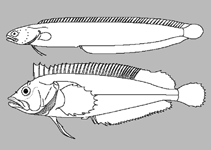| Native range | All suitable habitat | Point map | Year 2050 |

|
| This map was computer-generated and has not yet been reviewed. |
| Gibbonsia metzi AquaMaps Data sources: GBIF OBIS |
Google imageNo image available for this species;
drawing shows typical species in Clinidae.
Classification / Names Common names | Synonyms | Catalog of Fishes(genus, species) | ITIS | CoL | WoRMS | Cloffa
Etymology: metzi: Named after W.P. Gibbons, an early naturalist from Alameda, California and C.W. Metz, perceptive student of the genus Gibbonsia (Ref. 6885, 27436).
Eponymy: Dr William P Gibbons (1812–1897) was a physician and naturalist from Delaware. [...] Dr Charles William Metz (1889–1975) was an American zoologist, geneticist and taxonomist whose doctorate was awarded by Stanford University. He co-wrote: A catalog of the fishes known from the waters of Korea (1913). (Ref. 128868), visit book page.
More on author: Hubbs.
Environment: milieu / climate zone / depth range / distribution range Ecology
Distribution Territories | FAO areas | Ecosystems | Occurrences | Point map | Introductions | Faunafri
Size / Weight / Age
Short description Identification keys | Morphology | Morphometrics
Body shape (shape guide): elongated.
Life cycle and mating behavior Maturity | Reproduction | Spawning | Eggs | Fecundity | Larvae
Main reference
Upload your references | References | Coordinator : Williams, Jeffrey T. | Collaborators
CITES
Threat to humans
Human uses
More information
Growth parameters
Max. ages / sizes
Length-weight rel.
Length-length rel.
Length-frequencies
Mass conversion
Recruitment
Abundance
Reproduction
Maturity
Maturity/Gills rel.
Fecundity
Spawning
Spawning aggregations
Eggs
Egg development
Larvae
Larval dynamics
Gill area
Brain
Otolith
Body composition
Nutrients
Oxygen consumption
Swimming type
Swimming speed
Visual pigments
Fish sound
Diseases & Parasites
Toxicity (LC50s)
Genome
Genetics
Heterozygosity
Heritability
Genetic Diversity
Aquaculture systems
Aquaculture profiles
Strains
Ciguatera cases
Stamps, coins, misc.
Tools
Special reports
Download XML



